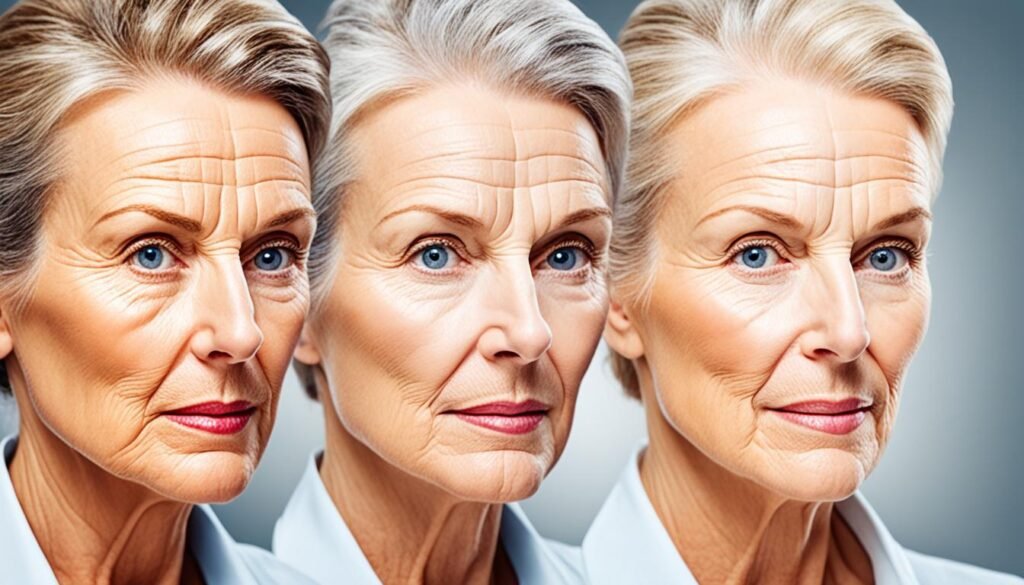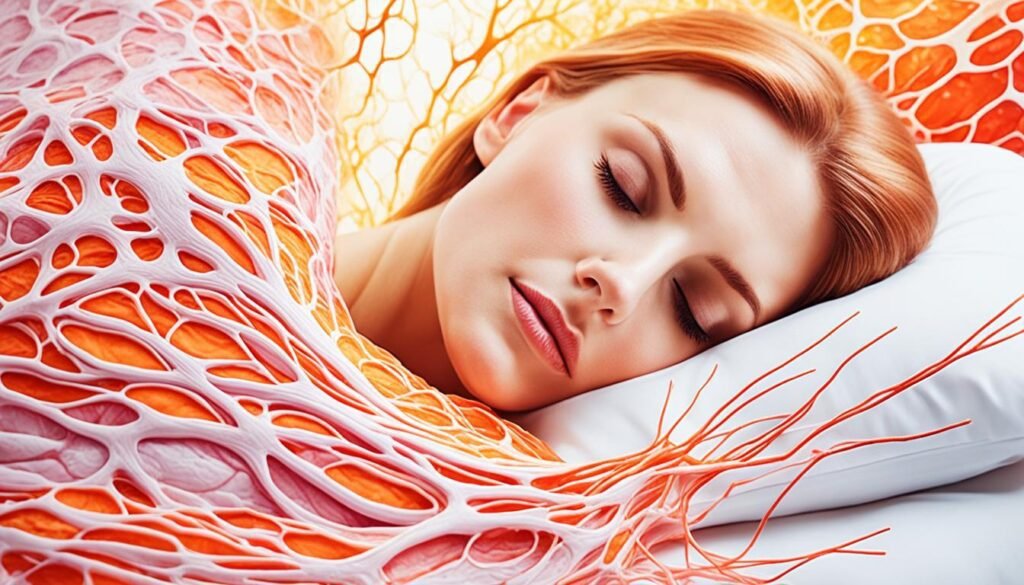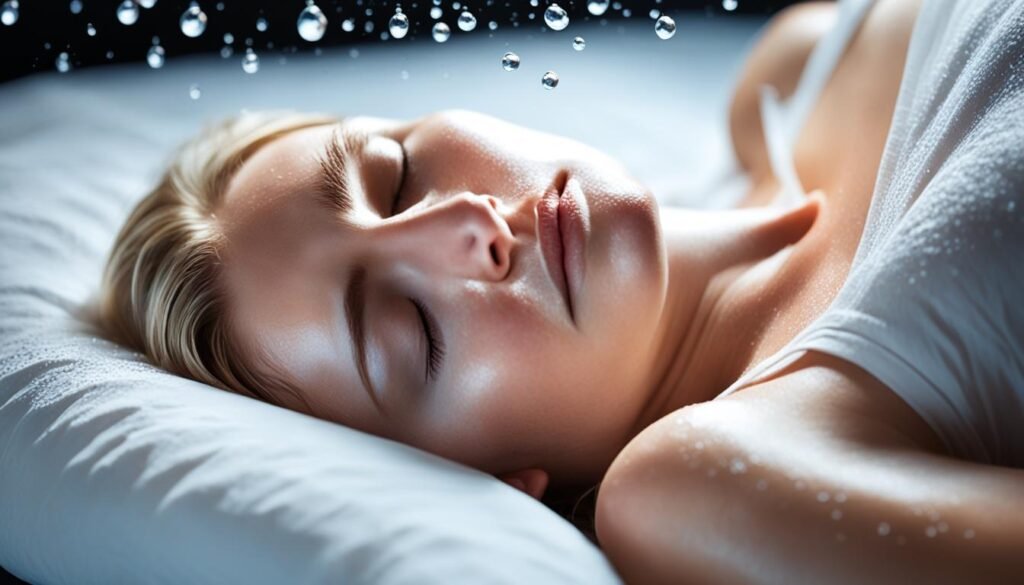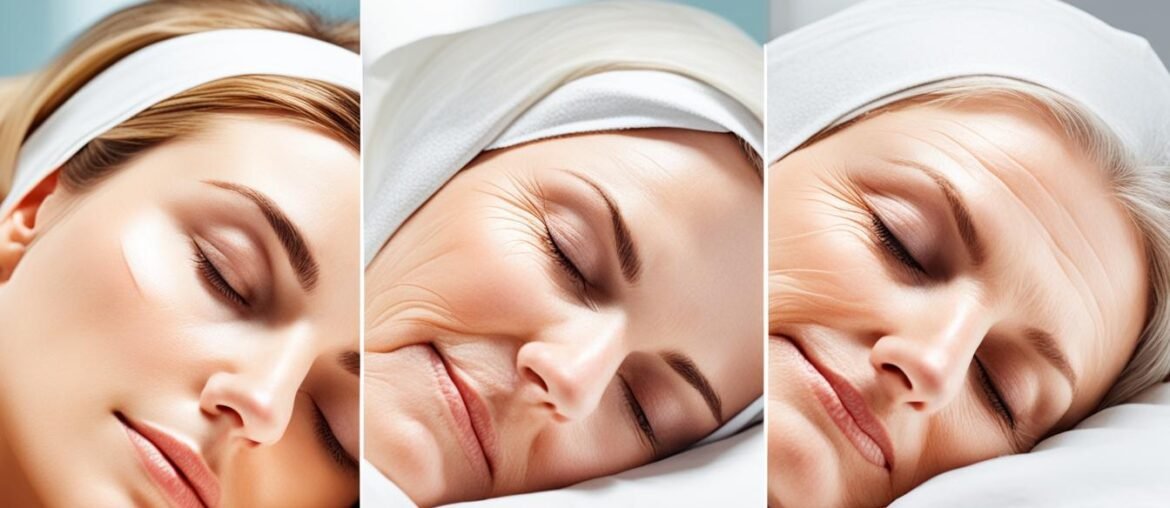Did you know that sleep quality has a direct impact on your skin health? Yes, it’s true! The importance of sleep for maintaining healthy skin cannot be overstated. Lack of quality sleep can lead to a range of skin issues and accelerate the aging process. In this in-depth study, we will delve into the effects of sleep on your skin, the role of the circadian rhythm, the link between sleep deprivation and skin problems, and the rejuvenating processes that occur during sleep. Get ready to discover how optimal sleep can transform your skin!
Key Takeaways:
- Adequate and quality sleep is essential for optimal skin rejuvenation, repair, and protection.
- Poor sleep quality can contribute to accelerated skin aging, wrinkles, and skin dryness.
- Sleep deprivation can worsen skin problems such as acne, psoriasis, and eczema.
- During sleep, the body engages in skin-rejuvenating processes like collagen production and skin cell turnover.
- Melatonin, a hormone produced during sleep, plays a vital role in skin health by acting as an antioxidant and supporting UV protection.
The Circadian Rhythm and Skin Health
The circadian rhythm, also known as the biological clock, plays a crucial role in various physiological processes, including those related to the skin. Within the skin, there exists a unique internal clock referred to as the skin clock. This skin clock regulates essential cellular processes such as skin regeneration, DNA repair, and the skin barrier function.
The skin clock relies on clock genes, which are responsible for maintaining the health and integrity of the skin. These clock genes coordinate and synchronize the timing of different skin cellular processes, ensuring optimal functioning and efficiency.
One key factor associated with the regulation of the skin’s circadian rhythm is melatonin, a hormone produced during sleep. Melatonin has been found to have antioxidant and anti-aging effects on the skin. It helps to protect the skin against oxidative stress and damage, supporting overall skin health and vitality.
“The skin clock, controlled by clock genes, regulates essential cellular processes in the skin, such as regeneration, DNA repair, and the skin barrier function.”
| Biological Clock | Skin Clock | Clock Genes |
|---|---|---|
| Regulates physiological processes in the body | Controls skin cellular processes | Maintains skin health and integrity |
| Coordinates sleep-wake cycles | Synchronizes skin regeneration | Ensures efficient DNA repair |
| Impacted by light exposure | Influenced by melatonin | Supports optimal skin barrier function |
The interplay between the circadian rhythm, clock genes, and melatonin highlights the intricate relationship between sleep and skin health. Maintaining a healthy circadian rhythm through proper sleep habits and supporting the skin’s internal clock can contribute to improved skin function, including enhanced skin regeneration, DNA repair, and skin barrier function.
Sleep Quality and Skin Aging

Poor sleep quality can have a significant impact on the aging process of the skin, leading to the formation of wrinkles, fine lines, and a decrease in skin elasticity. Various studies have shown that inadequate sleep is associated with premature aging of the skin.
Chronic sleep deprivation can disrupt the delicate balance of hormones in the body, resulting in increased levels of stress hormones such as cortisol. Elevated cortisol levels can lead to inflammation and oxidative stress, both of which contribute to the breakdown of collagen and elastin, the proteins responsible for maintaining skin firmness and elasticity.
Glycation, another process influenced by poor sleep quality, is associated with premature aging. Glycation refers to the binding of sugar molecules to proteins like collagen and elastin, resulting in the formation of advanced glycation end products (AGEs). These AGEs contribute to the development of wrinkles, loss of skin elasticity, and a dull complexion.
Sleep deprivation not only affects the structure of the skin but also impairs its natural ability to repair and regenerate. During sleep, the body undergoes essential restorative processes that help maintain skin health. Inadequate sleep disrupts these processes, hindering the skin’s ability to recover from daily environmental stressors.
It is crucial to prioritize sleep quality to prevent accelerated skin aging. Establishing a consistent sleep routine, creating a sleep-friendly environment, and adopting relaxation techniques can all contribute to improving sleep quality and promoting healthier, more youthful-looking skin.
Next, let’s explore the relationship between sleep deprivation and various skin problems.
Sleep Deprivation and Skin Problems
Lack of sleep can have detrimental effects on the skin, aggravating various skin conditions such as acne, psoriasis, and eczema. Sleep deprivation disrupts the skin’s natural barrier function, leading to increased water loss, dryness, and heightened susceptibility to irritants and allergens. The compromised skin barrier can allow harmful substances to penetrate the skin more easily, triggering inflammation and exacerbating existing skin problems or contributing to the development of new ones.
Sleep deprivation also stimulates the body’s inflammatory response, releasing pro-inflammatory cytokines that can further worsen skin conditions. Inflammation is known to play a crucial role in the pathogenesis of acne, psoriasis, and eczema, exacerbating symptoms and prolonging the healing process.
Proper and adequate sleep is essential for maintaining a healthy skin barrier and reducing inflammation. By prioritizing sufficient sleep, individuals can support the skin’s natural defense mechanisms, minimize the risk of skin problems, and promote overall skin health.
Sleep Deprivation and Acne
Insufficient sleep can worsen acne symptoms and contribute to the formation of new breakouts. Sleep deprivation increases the production of stress hormones, such as cortisol, which can lead to an overproduction of sebum, clogging the pores and facilitating the growth of acne-causing bacteria. Additionally, inadequate sleep can compromise the skin’s ability to heal and regenerate, prolonging the duration of acne lesions.
Sleep Deprivation and Psoriasis
Psoriasis is a chronic autoimmune skin condition characterized by red, scaly patches on the skin. Lack of sleep can trigger psoriasis flare-ups and intensify symptoms. Sleep deprivation disrupts the delicate balance of immune-regulating cells, leading to an overactive immune response and increased inflammation. This inflammatory response can exacerbate the redness, scaling, and itching associated with psoriasis.
Sleep Deprivation and Eczema
Eczema, also known as atopic dermatitis, is a chronic skin condition characterized by dry, itchy, and inflamed skin. Sleep deprivation can aggravate eczema symptoms and disrupt the skin’s natural barrier function. Inadequate sleep reduces skin hydration and impairs the skin’s ability to retain moisture, leading to increased dryness, itching, and vulnerability to irritants. Sleep deprivation can also trigger stress, which is known to worsen eczema symptoms.
Sleep and Skin-Rejuvenating Processes

During sleep, the body undergoes various skin-rejuvenating processes. These processes play a crucial role in maintaining the health and vitality of our skin. Let’s explore the different ways in which sleep contributes to skin rejuvenation.
Collagen Production
Collagen is a protein that provides elasticity and firmness to the skin. During sleep, the body produces collagen at an increased rate, allowing for the repair and renewal of damaged skin cells. This process helps to combat the signs of aging and maintain a youthful appearance.
Blood Flow to the Skin
“During sleep, the blood vessels in our skin dilate, increasing blood flow to the surface. This brings essential nutrients and oxygen to the skin cells, promoting their health and vitality.” – Dr. Jessica Smith, Dermatologist
Blood flow plays a vital role in nourishing the skin. Improved blood circulation during sleep helps in the delivery of vital nutrients and oxygen to the skin cells, supporting their regeneration and rejuvenation. This increased blood flow also gives the skin a healthy, radiant glow.
Skin Cell Turnover
In addition to collagen production and improved blood flow, sleep promotes skin cell turnover. This process involves shedding dead skin cells and replacing them with new ones. During sleep, the body removes old and damaged skin cells, allowing fresh, healthy cells to come to the surface. This turnover process helps to maintain clear, youthful-looking skin.
Antioxidant Defense
“Sleep is a time of active restoration for the skin. It allows the body to replenish its antioxidant defenses, which help protect the skin against oxidative damage caused by factors like pollution and UV radiation.”
Throughout the day, our skin is exposed to various environmental stressors that can lead to oxidative damage. During sleep, the body replenishes its antioxidant defense system, which neutralizes harmful free radicals and protects the skin from premature aging and other negative effects.
| Benefits of Sleep for Skin Rejuvenation | |
|---|---|
| Increased collagen production | Improved skin elasticity and firmness |
| Enhanced blood flow to the skin | Nourished and radiant complexion |
| Promoted skin cell turnover | Clear and youthful-looking skin |
| Replenished antioxidant defenses | Protection against oxidative damage |
The Role of Melatonin in Skin Health
Melatonin, a hormone produced by the pineal gland during sleep, plays a crucial role in maintaining skin health. Not only is melatonin involved in regulating sleep-wake cycles, but it also offers multiple benefits for the skin.
One of the key roles of melatonin in skin health is its antioxidant properties. As a potent antioxidant, melatonin helps to protect the skin against oxidative damage caused by UV radiation and other environmental factors. This protection is essential in preventing premature aging and reducing the risk of various skin conditions.
In addition to its antioxidant effects, melatonin also regulates skin pigmentation. It helps to balance melanin production, which can offer some protection against UV-induced skin damage. By regulating pigmentation, melatonin helps to maintain a more even skin tone and reduce the appearance of dark spots and hyperpigmentation.
Furthermore, melatonin has been found to promote wound healing and improve the process of skin regeneration. Studies have shown that melatonin enhances the production of collagen, a protein that plays a crucial role in wound healing and maintaining skin elasticity. By promoting collagen synthesis, melatonin helps the skin to heal faster and more effectively.
Overall, melatonin plays a significant role in supporting skin health. Its antioxidant properties protect the skin from damage, its regulation of pigmentation helps maintain an even skin tone, and its promotion of wound healing aids in skin regeneration.
Sleep Duration and Skin Hydration

The duration of sleep has a significant impact on the hydration levels of the skin. Inadequate sleep has been linked to increased transepidermal water loss (TEWL), which can lead to decreased skin hydration. Our skin’s natural moisture is essential for maintaining a healthy skin barrier function and preventing dryness. Therefore, it is crucial to prioritize sleep duration for optimal skin health and proper moisturization.
During sleep, our body goes through various reparative processes, including skin rejuvenation and hydration replenishment. The longer the duration of sleep, the more time our skin has to restore its moisture levels and strengthen its protective barrier. This, in turn, helps to combat dryness and maintain a healthy, hydrated complexion.
Sufficient sleep allows our skin to retain moisture and improves its ability to lock in hydration. Sleep duration impacts the skin’s natural moisturizing factors, essential components that help the epidermis retain water. When TEWL increases due to inadequate sleep, these moisturizing factors are compromised, resulting in skin dryness and potential dehydration.
Furthermore, longer sleep duration promotes a more balanced water balance in the skin, preventing excessive moisture loss and supporting optimal hydration. Adequate hydration is vital for maintaining skin health and preventing various skin problems such as dryness, flakiness, and dullness.
To emphasize the importance of sleep duration for skin hydration, let’s take a look at the following table:
| Sleep Duration | Transepidermal Water Loss (TEWL) | Skin Hydration |
|---|---|---|
| Less than 6 hours | Increased | Decreased |
| 6-8 hours (recommended) | Optimal | Healthy |
| More than 8 hours | Minimal | Optimal |
The table clearly demonstrates the relationship between sleep duration, TEWL, and skin hydration. With less than 6 hours of sleep, TEWL increases, resulting in decreased skin hydration. On the other hand, a sleep duration of 6-8 hours, which is recommended for adults, allows for optimal TEWL and healthy skin hydration. Extending sleep duration to more than 8 hours further minimizes TEWL and supports optimal skin hydration.
As the image above illustrates, sleep duration directly influences the skin’s moisture balance and hydration levels. Prioritizing a consistent and sufficient sleep duration is crucial for maintaining the integrity of the skin’s barrier function and ensuring optimal skin hydration.
Sleep, Stress, and Skin Health

Sleep and stress have a bidirectional relationship, with each influencing the other. Lack of sleep can increase stress levels, leading to elevated cortisol (stress hormone) levels. Elevated cortisol can trigger skin inflammation and exacerbate various skin conditions, such as acne and eczema. On the other hand, chronic stress can disrupt sleep patterns, further exacerbating skin problems. Managing stress and improving sleep quality are essential for maintaining healthy skin.
The Impact of Stress Hormones on Skin Health
When we experience stress, our bodies release stress hormones, including cortisol. Elevated cortisol levels can have detrimental effects on the skin, as it triggers inflammation and disrupts the normal functioning of skin cells. This can lead to increased oil production, clogged pores, and the development of acne. Additionally, cortisol can impair the skin’s natural barrier function, making it more vulnerable to irritants and bacteria.
Furthermore, stress-induced inflammation can worsen existing skin conditions such as eczema and psoriasis. Inflammation in the body can cause skin redness, itching, and flaking, exacerbating the symptoms of these conditions and making them more difficult to manage.
The Role of Sleep in Managing Stress and Promoting Skin Health
Sleep plays a crucial role in managing stress and promoting skin health. During sleep, the body has an opportunity to recover and repair itself, including the skin. Adequate sleep allows for the regulation of stress hormones, such as cortisol, helping to reduce inflammation and maintain a healthy balance in the body.
Moreover, getting enough sleep improves overall well-being, which in turn can have a positive impact on stress levels. When we are well-rested, we are better equipped to handle daily stressors, leading to fewer stress-related flare-ups of skin conditions.
Implementing Strategies to Improve Sleep and Manage Stress
To improve sleep quality and manage stress for better skin health, consider incorporating the following strategies:
- Establish a consistent sleep schedule, going to bed and waking up at the same time each day.
- Create a relaxing bedtime routine to signal to your body that it’s time to wind down. This may include activities such as reading, taking a warm bath, or practicing meditation.
- Create a sleep-friendly environment by keeping your bedroom cool, dark, and quiet.
- Avoid stimulating activities and screen time close to bedtime, as they can interfere with sleep quality.
- Incorporate stress-relieving practices into your daily routine, such as yoga, deep breathing exercises, or practicing mindfulness.
- Seek support from a healthcare professional or therapist if stress is significantly impacting your sleep and overall well-being.
By prioritizing sleep and adopting stress-management techniques, you can support your skin’s health and overall vitality.
Sleep Recommendations for Healthy Skin

To promote optimal skin health, it is important to prioritize quality sleep. By following these sleep recommendations, you can establish healthy sleep habits that support overall well-being, including skin health:
- Optimal Sleep Duration: Aim for 7-9 hours of sleep per night, as this is the recommended duration for adults.
- Sleep Hygiene: Practice good sleep hygiene by creating a relaxing pre-sleep routine and maintaining a consistent sleep schedule.
- Bedtime Routine: Establish a calming bedtime routine that helps signal to your body that it’s time to sleep. This could include activities such as reading a book, taking a warm bath, or practicing relaxation exercises.
- Sleep Environment: Create a sleep-friendly environment by ensuring your bedroom is cool, dark, and quiet. Consider using blackout curtains, earplugs, or a white noise machine if necessary.
- Relaxation Techniques: Implement relaxation techniques before bed, such as deep breathing, meditation, or gentle stretching, to help calm your mind and prepare for sleep.
- Healthy Sleep Habits: Develop healthy sleep habits by avoiding caffeine and electronic devices close to bedtime, exercising regularly, and maintaining a comfortable mattress and pillows.
By incorporating these sleep recommendations into your daily routine, you can support your skin’s rejuvenation, repair, and protection, ultimately promoting healthy skin.
Conclusion
Sleep plays a significant role in maintaining healthy skin. Adequate and quality sleep is essential for optimal skin rejuvenation, repair, and protection. Lack of sleep can contribute to skin aging, skin problems, and compromised skin barrier function. On the other hand, proper sleep supports collagen production, blood flow, skin cell turnover, and antioxidant defense. By prioritizing healthy sleep habits, individuals can enhance their skin health and overall well-being.
FAQ
How does sleep affect skin health?
Sleep plays a crucial role in maintaining healthy skin. It impacts various factors such as aging, skin barrier function, and skin problems. Adequate and quality sleep allows for optimal skin rejuvenation, repair, and protection.
What is the relationship between sleep and skin aging?
Lack of sleep can contribute to the formation of wrinkles, fine lines, and a decrease in skin elasticity. Chronic sleep deprivation can lead to increased stress hormones, inflammation, and oxidative stress, which accelerate skin aging.
Can sleep deprivation worsen skin problems?
Yes, sleep deprivation can exacerbate skin problems such as acne, psoriasis, and eczema. It disrupts the skin’s barrier function, increases water loss and dryness, and triggers inflammation.
How does sleep promote skin rejuvenation?
During sleep, collagen production increases, blood flow to the skin improves, and skin cell turnover occurs. These processes allow for the removal of dead skin cells and the regeneration of new ones, promoting a rejuvenated appearance.
What is the role of melatonin in skin health?
Melatonin, a hormone produced during sleep, acts as a potent antioxidant, protects against UV-induced skin damage, regulates pigmentation, and promotes wound healing and skin regeneration.
Can sleep duration affect skin hydration?
Yes, inadequate sleep can lead to increased transepidermal water loss and decreased skin hydration. Longer sleep duration supports better skin hydration and helps maintain a healthy skin barrier function.
How does sleep relate to stress and skin health?
Lack of sleep can increase stress levels, leading to elevated cortisol levels, which trigger skin inflammation and worsen skin conditions. Chronic stress can also disrupt sleep patterns and further contribute to skin problems.
What are some sleep recommendations for healthy skin?
It is important to prioritize healthy sleep habits such as ensuring an adequate sleep duration, practicing good sleep hygiene, establishing a consistent bedtime routine, creating a sleep-friendly environment, and implementing relaxation techniques before bed.
Can improving sleep quality enhance overall skin health?
Yes, by prioritizing healthy sleep habits, individuals can enhance their skin health and overall well-being. Adequate and quality sleep supports optimal skin rejuvenation, repair, and protection.
Conclusion
Sleep plays a significant role in maintaining healthy skin. Adequate and quality sleep is essential for optimal skin rejuvenation, repair, and protection. By prioritizing healthy sleep habits, individuals can enhance their skin health and overall well-being.




